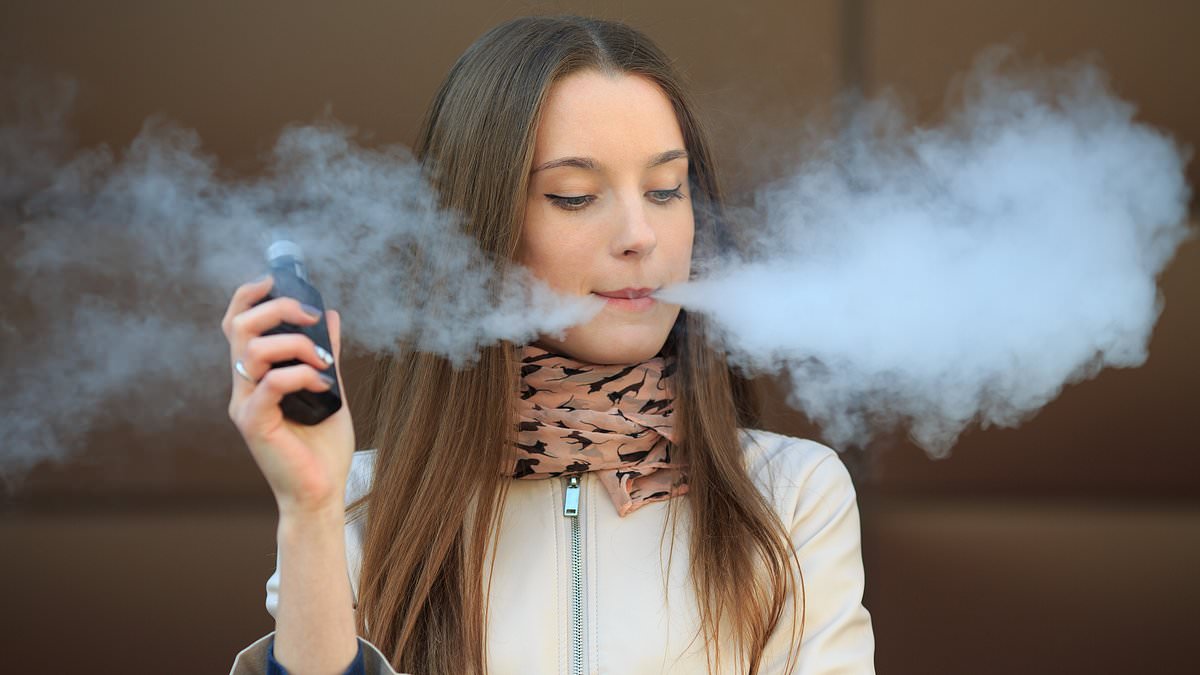Copyright dailymail

A surge in women vaping has made e-cigarettes more popular than smoking tobacco for the first time. One in ten Britons aged over 16 - around 5.4million - said they used e-cigarettes daily or occasionally last year, slightly up from 9.8 per cent the year before. This compared with 9.1 per cent - around 4.9million people - who said the same for traditional cigarettes, down from 10.5 per cent. Highlighting how vaping has become the ‘new normal’, a decade before (2014) nearly one in five smoked tobacco, compared to just 3.7 per cent who vaped. The ONS study, published today, also revealed that vaping's rising popularity was being driven by women. While the proportion of men using e-cigarettes daily or occasionally fell from 11 per cent in 2023 to 10.1 per cent last year, among women it surged from 8.5 per cent to 10 per cent. This suggests more women than men are trying to quit tobacco, with more men than women still smoking overall. Around 3million men (12.3%) and 2.3million women (9.0%) reported being smokers. Daily or occasional vaping was highest among people aged 16 to 24 last year (13 per cent), although this was down from 15.8 per cent. Daily use of e-cigarettes was highest among 35 to 49-year-olds (9.5 per cent). Meanwhile, the proportion of people who indicated they previously smoked but had now quit surged to 74.2 per cent last year, up from 70.9 per cent in 2023, suggesting that vaping has helped play a role in growing numbers ditching smoking. The areas with the highest proportion of smokers recorded were Fenland, in Cambridgeshire, followed by Blackpool (19.7 per cent) and South Holland (18.9 per cent), in Lincolnshire. The lowest were Woking (4.2 per cent), in Surrey, followed by nearby Epsom and Ewell (4.8 per cent) and St Albans, in Hertfordshire. Smoking was also found to be five times as high within working class areas. Of people who had no qualifications last year, 26 per cent were smokers. However, for those with a university degree or the equivalent qualification it was just 5.1 per cent. A higher proportion of jobless people (17.5%) were smokers than those in paid work (9.9 per cent). The biggest reduction in smoking in terms of age groups was among those between 18 and 24-years-old, with the proportion of these people reporting themselves as smokers dropping from 25.7 per cent in 2011 to 8.1 per cent last year. The number of tobacco smokers has been falling for decades. In 1982, the number of non-smokers overtook the number of smokers for the first time. It has continued to decline sharply, particularly since the ban on smoking in enclosed public spaces, such as pubs and restaurants, from 2006. Amid the rise in popularity of vaping, the government has sought to better regulate the industry. The Tobacco and Vapes Bill is currently making its way through Parliament and will ban the advertising and sponsorship of vapes and nicotine products while giving ministers more powers to regulate the flavours, packaging and display of vapes so that they do not appeal to children. The Bill will also bring in a ban on vaping and nicotine products being sold to under 18s. Deborah Arnott, honorary associate professor at University College London (UCL), said: ‘The ONS data showing that more people now vape than smoke underlines the need for greater regulation. 'Vaping is not risk-free and should only be used to help smokers quit it, but inadequate regulation has led to the growth in use of e-cigarettes by never smokers in recent years, particularly among young people. ‘The Tobacco and Vapes Bill currently before Parliament must be put on the statute book without delay. ‘Then, and only then, can regulations be brought forward to reduce the appeal and accessibility of vapes to those who've never smoked.’ Hazel Cheeseman, chief executive of Action on Smoking and Health, said: ‘It is a significant moment that for the first time more adults consume nicotine through vapes than tobacco. ‘The growth in vaping has almost certainly contributed to the fall in smoking and is therefore to be welcomed. ‘However, the concerns about non-smokers and young people taking up vaping remain. ‘New powers to further regulate vapes in the Tobacco and Vapes Bill are a good opportunity to maintain the current trends by restricting marketing and reinforcing the role of vapes as a quitting tool.’



